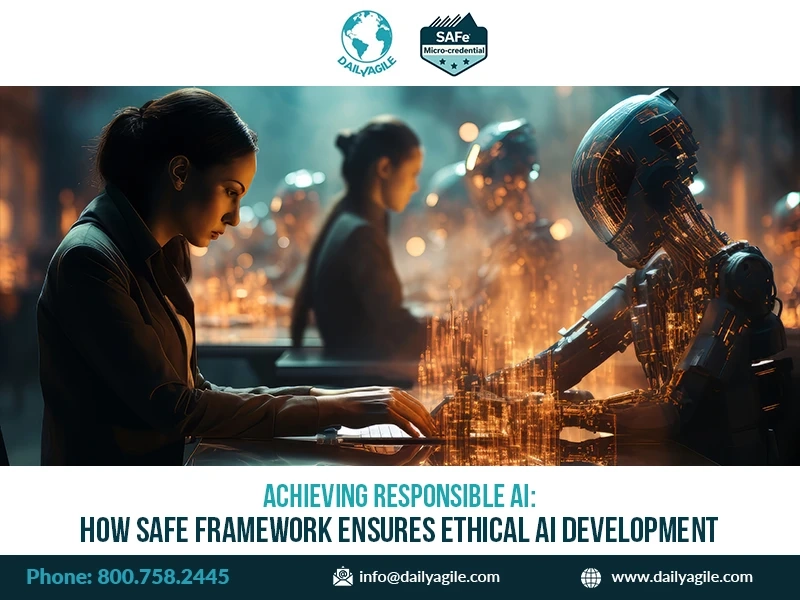Artificial Intelligence (AI) is transforming industries worldwide. From automating tasks to improving decision-making, AI has become an essential part of modern business. However, with its rise, concerns about ethics, fairness, and accountability have also grown. Companies must ensure that AI systems are not only effective but also responsible. This is where the SAFe framework (Scaled Agile Framework) plays a crucial role. By integrating ethical principles into AI development, organizations can create solutions that are transparent, fair, and aligned with societal values.
Understanding Responsible AI
Responsible AI refers to the development and deployment of AI systems that are ethical, transparent, and accountable. It ensures that AI technology does not cause harm, respects privacy, and promotes fairness. Without clear guidelines, AI can lead to biased outcomes, security risks, and ethical dilemmas. Companies must take proactive measures to ensure that AI is used responsibly.
Several key principles define responsible AI:
- Fairness – AI systems must not favor one group over another.
- Transparency – Users should understand how AI makes decisions.
- Accountability – Organizations must take responsibility for AI outcomes.
- Security – AI systems must be protected against misuse.
- Privacy – Personal data should be handled with care.
Without a structured approach, implementing these principles can be challenging. This is where the SAFe framework helps organizations build AI systems that meet ethical standards.
How SAFe Aligns AI with Ethical Principles
This framework is designed to scale Agile practices across large organizations. It provides structured guidelines for developing complex systems, including AI. By integrating ethical considerations at every stage, SAFe ensures that AI solutions align with societal expectations.
- Ethical AI Governance: SAFe emphasizes governance at every level. This includes clear policies for AI development, regular audits, and compliance with ethical standards. Companies can create AI ethics committees to oversee decision-making, ensuring that AI systems do not introduce bias or harm.
- Cross-Functional Collaboration: AI development involves multiple teams, including data scientists, engineers, business leaders, and legal experts. SAFe encourages cross-functional collaboration to ensure that ethical concerns are addressed from the start. This prevents ethical issues from being overlooked in the rush to deploy AI models.
- Continuous Learning and Adaptation: AI systems evolve over time. New data and changing conditions can introduce risks. SAFe promotes continuous learning through feedback loops, testing, and regular reviews. This ensures that AI models remain fair and accountable throughout their lifecycle.
- Transparency and Explainability: One of the biggest challenges in AI is the "black box" problem—when AI decisions are difficult to understand. SAFe promotes transparency by encouraging documentation, clear reporting, and stakeholder communication. AI models should provide explanations for their decisions so that users can trust their outcomes.
- User-Centered Development: AI should be designed with the end-user in mind. SAFe’s Agile approach prioritizes user feedback, ensuring that AI solutions are ethical and practical. By involving users early in the process, organizations can identify potential biases and improve AI interactions.
- Security-First Approach: AI systems are vulnerable to cyber threats. SAFe integrates security practices into every stage of development. Organizations must ensure that AI models are robust against attacks, protect user data, and comply with privacy regulations.
Real-World Applications of Responsible AI with SAFe
Achieving responsible AI with SAFe ensures ethical, transparent, and accountable AI development for modern businesses.These businesses recognize the importance of balancing innovation with ethics.
- Healthcare AI: Hospitals use AI for diagnostics, but biased data can lead to incorrect diagnoses. By applying SAFe principles, healthcare providers ensure that AI models are trained on diverse datasets, improving fairness.
- Finance and Risk Management: AI-driven credit scoring and fraud detection systems must be fair. SAFe ensures that AI in finance is transparent and free from discriminatory practices.
- Retail and Customer Experience: AI personalizes shopping experiences. However, if not carefully managed, AI can reinforce stereotypes. SAFe helps retailers develop AI solutions that respect customer preferences and ethical considerations.
The Future of Responsible AI with SAFe
As AI continues to grow, businesses must prioritize ethics alongside innovation. Governments are introducing regulations, and consumers expect companies to use AI responsibly. Organizations that fail to consider ethical implications risk legal issues and reputational damage.
It offers a structured way to integrate responsible AI principles into development. By following its guidelines, companies can build AI systems that are transparent, fair, and accountable.
Building a Culture of Ethical AI
Creating responsible AI is not just about technology—it requires a cultural shift. Organizations must train teams on ethical AI principles and encourage responsible decision-making. Leadership should promote transparency and accountability at all levels. By fostering a culture where ethics and innovation go hand in hand, companies can build AI solutions that are not only powerful but also trustworthy. With this framework, businesses can ensure that AI development remains aligned with human values, protecting both users and society.
Final Thoughts
AI has the power to transform industries, but it must be developed responsibly. The SAFe framework provides a structured approach to ensuring that AI aligns with ethical principles. Companies that adopt SAFe for AI development can create solutions that benefit society while maintaining trust and transparency.
For organizations looking to implement ethical AI strategies, DailyAgile offers expertise in Agile and SAFe methodologies. Stay ahead by integrating responsible AI practices into your business today.



